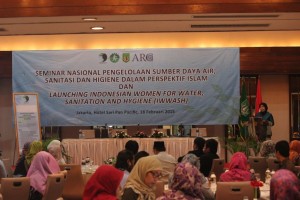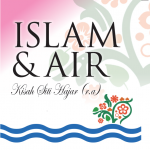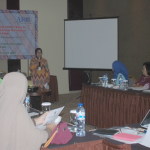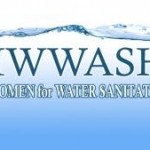JAKARTA (February 18, 2015): Twenty nine (29) Muslim women’s organizations from all around Indonesia today launched a new network dedicated to bringing clean water, proper sanitation and hygiene education to everyone.
The network is titled Indonesian Women for Water, Sanitation, and Hygiene, or IWWASH.
“IWWASH was formed to link Indonesian Muslim women, so that together we can lead the drive to bring clean water, adequate toilets and water education into all communities, based on the teachings of Islam about sharing and about water,” said Dr Husmiaty Hasyim, Chairwomen of Headquarter Persatuan Ummat Islam (PUI), in representing the network.
It is an initiative by the Universitas Nasional (UNAS) supported by the international Alliance of Religions and Conservation (ARC) based in the UK and the Dutch philanthropic fund, Valley Foundation.
“Indonesia is a big country with the largest Muslim population in the world,” said conservationist Dr. Fachruddin Mangunjaya Vice Chairman UNAS Centre for Islamic Studies who has been supporting the initiative from the beginning through ARC and the Universitas Nasional. “Indonesia an important role in the frontline to show how life can be better; and to save lives through clean water.”
Like most countries around the world, Indonesia is facing extreme challenges of development, and both secular and Muslim leaders have emphasized the importance of empowering people in managing the huge problem of clean water, sanitation and environmental health.
This initiative is stronger because it goes through Islamic teachings and practice: the Qu’ran is very explicit about the importance, and beauty, of clean water.
The initiative has caught the imagination of many groups already. In September, 16 women’s organizations committed to establishing this network, but by the time of the launch today, two months later, there were 29.
The announcement of this network was officially launched by Minister of Health, Prof. Dr. Nila. F. Moeloek that was represented by Director of Environmental Health, drh. Wilfried Purba, and Deputy Secretary General, Indonesian Ulema Council, Prof. Dr. Amany Lubis (Wednesday, 02/18 ) in Jakarta.
In her speech, Minister of Health said that IWWASH networks in line with preventive promotive program of national target according to the National Medium Term Development Plan ( RPJMN ) 2015-2019 , namely Universal Access Water and Sanitation 2019 through the provision of access to drinking water and sanitation 100 % for all Indonesian people.
Ministry of Health also open a seminar titled “Water, Sanitation and Environmental Health in the Islamic Perspective.”
National and international figures were present, including Dr. Didin Hafidhuddin, chairman of BAZNAS, a government-supported charitable organisation that collects zakat from Muslims to help the needy and small business owners across Indonesia. Zakat means “grow in goodness” and Muslims consider the act giving zakat as a way of giving thanks to God for any material well-being you have acquired.
Also present at the launch was Dr Husna Ahmad from the UK, representing ARC. Dr Ahmad has worked on innovative Muslim women and water programmes around the world. She talked about her experience in water, sanitation and hygiene innovation in several other countries, including Bangladesh.
“We want to help establish an ethos hospitality in sharing water and hygiene knowledge,” said Professor Ernawati Sinaga, Vice Rector for Research, Community Service and Collaboration Universitas Nasional, who was also one of the key initiators of the symposium and network.
“These initiatives are happening anyway, but we hope that by bringing them together in a network, these Muslim women leaders will be empowered through new friendships and alliances – and knowing they are not alone – to do even more.”
“Hopefully, through this network, there will be a synergy and spirit of Muslim women to move in the field of public education and cultivation of Islamic values, especially in water conservation, sanitation and environmental health.
“Islam teaches good environmental care,” Professor Sinaga added.
Contact:
• Universitas Nasional Public Relation (PR) Manager, Dian Metha A (pr@civitas.unas.ac.id) +6281584366610
• Universitas Nasional, Pusat Pengajian Islam, Fachruddin Mangunjaya (fmangunjaya@civitas.unas.ac.id) +628129733393
• ARC: communications director, Victoria Finlay (victoriaf@arcworld.org) +44 1225 758004
Website for more information
www.iwwash.net
Notes for editors on WASH
Water, Sanitation, and Hygiene, also known as WASH, is a global program that is implemented by world agencies like the UN and countries around the world, including Indonesia. It is associated with the achievement of the MDGs (Millennium Development Goals). Indonesia’s vision for 2015 is to achieve more than 68% of its drinking water requirements, and for more than 62% of people to have adequate sanitation. The aim is for 100% of Indonesian people to enjoy the services of drinking water and sanitation. IWWASH is already helping to link communities and to encourage and support government programs on this issue.
Nowadays, with a population of 250 million people in 2014, Indonesia has the fourth highest population in the world, with about 84 million of them are children. The data reported by the World Bank in 2014, mentions, 2.5 billion people do not have access to sanitation services. This means that 1/3 of the world population. And 660 million of them, living in East Asia and the Pacific (including Indonesia). Meanwhile, the World Bank Water Sanitation Program (WSP) in 2013 and said, Indonesia is second in the world as a country with poor sanitation.
Sanitation and poor hygiene practices also unsafe drinking water contributed to 88 percent of child deaths due to diarrhea worldwide. In Indonesia, diarrhea remains a leading cause of death in children under five years old. The Important role hygiene is often overlooked. Actually Death and disease caused by diarrhea in general can be prevented.
In her speech , the Minister of Health, Prof. Dr. dr. Nila F. Moeloek said that the study conducted last few decades to prove that there is a strong positive relationship between attention to gender and women’s participation at the level of program success and sustainability of water and sanitation management . Globally various international meeting recommended the importance of women’s participation and involvement in the management of water and sanitation .
‘’The role of women is very important to put forward . Besides being about half of Indonesia’s population is female , women also play an important role as a center of life in the family . Women who become managers in the household , women who become role models for their children and families , ” said Minister of Health.
IWWASH networks in line with preventive promotive – national target according to the National Medium Term Development Plan ( RPJMN ) 2015-2019 , namely Universal Access Water and Sanitation 2019 through the provision of access to drinking water and sanitation 100 % for all Indonesian people.
Notes for editors on Islam and Water
O, you who believe, when you intend to offer the prayer, wash your faces and your hands up to [and including] the elbows, wipe [your wet hand] over your head and wash your feet up to [and including] the ankles (Qur’an 5:6)
It is surprising that Islamic teachings are not being used more widely to promote water conservation as they offer a basis for teaching people about conservation and a motivation for them to stick with it.” (Water Conservation Training Manual, 2012, by Islamic NGO, Global One)
IWWASH Indonesian Women for Water Sanitation and Hygiene
Established in 16 September 2014 in Taman Mini Indonesia Indah, Jakarta, IWWASH started as a network of 16 organisations committing to establish a network of Muslim women’s organization with the shared vision of improving WASH throughout the country based on Islamic teaching. For more details please refer to www.iwwash.net. The following are the network member up to 18 February 2015:
1. PP Muslimat NU
2. PP Wanita Islam
3. LPPM Universitas Nasional
4. Universitas Al Azhar Indonesia
5. Muslimat Center Dewan Da’wah Islamiah Indonesia
6. Persaudaraan Muslimah (SALIMAH)
7. PP Persistri (Persatuan Islam Istri)
8. PP Muslimat Dewan Da’wah (MDDII)
9. Baitul Mal Wattamwil (BMT) Bumi
10. Wanita Persatuan Umat Islam (PUI)
11. ISWI (Ikatan Sarjana Wanita Indonesia)
12. Yayasan Cikal Madani
13. Pusat Pengembangan Sumberdaya Wanita (PPSW)
14. LPPM Institute Sains Teknologi Al-Kamal
15. PKK Pasar Minggu, Jakarta Selatan
16. PKK Kelurahan Rawajati-(Kampung Agro Wisata Rawajati)
17. PKK Jatipadang
18. PKK Kel. Tanah Baru Kec. Pancoran Mas Depok
19. LPPM Universitas Pancasila
20. LPPM Institute Sains & Teknologi Nasional (ISTN)
21. LBBC Universitas Trisakti
22. PM Daarul Ulum Lido
23. P3M Politeknik Negeri Jakarta
24. IAIA Al Quroba
25. STID M Natsir
26. PLH SDA MUI
27. Islamic Centre Attaufiq
28. DeTARAA Foundation
29. Korpus PPI Wati
NATIONAL UNIVERSITY
National University, or UNAS, is Jakarta’s oldest university, and the second oldest in Indonesia. It was founded in 1949 on the initiative of leading figures in the independence movement. UNAS quickly came to the forefront of the Independence Movement.Today UNAS has nine faculties with 35 courses. Many research activities and community service initiatives have been carried out by the National University academic community, in the socio-political and cultural fields as well as in science and technology. www.unas.ac.id
Alliance of Religions and Conservation (ARC)
ARC is a secular body that helps the major religions of the world to develop their own environmental programmes (based on their own core teachings, beliefs and practices) and link with key secular conservation groups. It was founded in 1995 by HRH Prince Philip. www.arcworld.org
The Valley Foundation
The Valley Foundation was set up in 2009 with the vision that good sanitation practices and clean drinking water are the essentials of healthy life. It funds projects to make this happen more often. http://www.valleyfoundation.nl/contact.html







No Comments